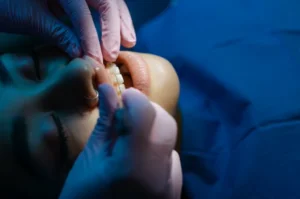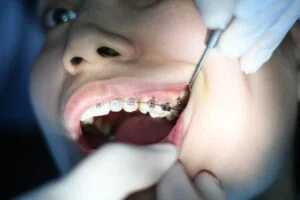
When people think about braces, they often imagine clunky headgear, a mouth full of metal, and some pain. However, while braces in the past may have been like this, at Hutta & Price Orthodontics, our experts provide treatment options that will have you smiling from start to finish! Read on to learn more about what braces feel like, how to enjoy a comfortable pain-free experience, and discover what kinds of oral pain you should never ignore.
ARE BRACES PAIN FREE OR PAINFUL?
What words do you associate with braces: pain, teenager, headgear? Much to our patients’ relief, it’s time to reimagine what you know about braces! These days, transforming your smile is comfortable, possible for patients of all ages, and is convenient and discreet. You can enjoy the incredible results of your braces, pain free! Though there is an adjustment period with new braces, treatment does not cause pain. Instead, anticipate some minor discomfort that goes away within a few days—like sore muscles after a good workout!
SO, WHAT CAUSES THIS SORENESS?

Many assume that braces work by pushing teeth into new positions. But it’s more complicated than that! Braces apply constant, gentle pressure to reshape your bones. This controlled pressure signals to your bone to break down and rebuild itself on a cellular level, allowing the teeth to move into place. While breaking down and building up bones may sound scary, in the hands of an expert orthodontist, braces are safe and comfortable.
Appliances, like a palatal expander, work similarly. These appliances strategically apply gentle pressure to influence a child’s growth and development. By working with a child’s natural growth cycle, our orthodontists can promote a wide, healthy dental arch using this appliance.
Though braces and aligners work in the same basic way, they do have differences. With self-ligating braces, slide mechanisms—rather than elastic ligatures—apply constant pressure on the archwires as they work to gradually transform your smile. With aligners, like Invisalign®, patients will feel the most pressure on their teeth at the start of new trays.
WHY YOU SHOULD VISIT AN EXPERT ORTHODONTIST

Because braces and orthodontic treatment impact your bone, jaw, and teeth, it is important that you visit an expert orthodontist for your smile needs. A skilled orthodontist, like Dr. Hutta or Dr. Price, can ensure that every part of your transformation is healthy and safe. Without having your treatment medically reviewed and monitored by an expert, you can risk pain, damage, and a less-than-perfect result.
Another reason to visit a skilled orthodontist is to make sure you receive the most advanced techniques and care. Because the orthodontic field is rapidly evolving, our team is dedicated to remaining cutting edge. Continuing education ensures that every treatment, technique, and technology is the very best. Our office combines the ever-evolving world of braces and teeth with decades of experience to customize your treatment to meet your needs. For instance, self-ligating braces in the hands of our experts make smile transformations more comfortable and hygienic. Plus, we have a variety of in-house diagnostic tools as well as technologies that provide patients cutting-edge care—without relying on outside lab providers.
YOUR FIRST WEEK WITH BRACES

After getting braces, aligners, or other appliances, you may feel some discomfort with your teeth and gums. However, soon you won’t even notice that you are wearing braces!
SORE TEETH TIPS
When you first get braces or an appliance, you may feel a little sore. This is normal, and fortunately, you will feel relief from any soreness within a few hours or days. On that first day of braces, do expect some soreness.
We recommend swishing with saltwater to reduce inflammation and ease any minor discomfort. If needed, use an over-the-counter pain reliever, like TYLENOL®. However, steer clear of ibuprofen since that can slow down your orthodontic treatment. During the first few days with braces or a new set of aligners, biting into firmer foods, like meat sandwiches, may be uncomfortable. Instead, try ultrasoft foods, like soup, ice cream, or macaroni and cheese.
TYPES OF DISCOMFORT YOU SHOULDN’T IGNORE

Outside of mild soreness, braces should be comfortable. Some patients may face discomfort related to issues like a poking wire, an orthodontic emergency, or a tight retainer. If this sounds like you, do not ignore your problem. Here are some common sources of discomfort or pain and some solutions:
- Fixable discomfort: Don’t ignore painful problems that you can easily fix! Have a poking wire? Carefully clip it and cover it with wax. Is an Invisalign or Smile Envy 3D tray digging into your gums? Let us know, and we can help. Is a bracket rubbing your cheek? This will go away with time. Until the skin toughens up, cover it with wax.
- Orthodontic emergencies: True emergencies are rare—but should never be ignored. If you are hit in the mouth, it can lead to severe injuries, broken appliances, and pain. Always seek the help of your general dentist and our orthodontists if you have an oral injury. Did you bite into a forbidden braces food and damage your appliances? Though a lesser emergency, you will still need to book an appointment to fix the problem, replace your bent wire, or reglue the broken bracket.
- Cavities or gum disease: You may not consider them emergencies; however, these are always serious concerns. Oftentimes, patients have a more challenging time maintaining proper oral hygiene during treatment with braces. If you are dealing with any oral pain or discomfort, visit your dentist to identify and treat the problem.
Pain from noncompliance: Aligners like Invisalign as well as retainers should fit snugly and comfortably—as long as you follow our instructions. However, if you have been noncompliant, be up front with our team. Forcing teeth into trays or retainers once your teeth have shifted out of place is never a good idea. Doing this can make teeth move too quickly and leave you with damage and pain.
A LIFELONG, HEALTHY SMILE

To prevent any oral pain during treatment, keep your smile safe, clean, and healthy! Dental hygiene is crucial to protect your teeth and avoid painful cavities or problems with your gums. Make sure to be extra vigilant while taking care of your teeth when you have braces, particularly after eating. Skip non-braces-friendly foods that are sticky, hard, or chewy. Avoiding these types of foods, such as popcorn or gum, while having braces will help you avoid cavities, gum disease, and staining. Always wear a mouthguard when playing sports, and always follow our instructions to keep your teeth on track—whether it’s your first day with braces or years down the line when you wear your retainer.
BOOK YOUR ORTHODONTIC APPOINTMENT TODAY!

Ready to begin your orthodontic journey? A complimentary initial consultation is at your fingertips! Just fill out our quick online form and we will be in contact soon, ready to help you get started with appointments that work for your schedule. If you have any questions, feel free to call us directly at (614) 855-8800. We want to know your goals for your teeth and work with you for your orthodontic needs.
COMPLETE YOUR VIRTUAL CONSULTATION

Is your schedule jam-packed? No need to worry! With our virtual orthodontic consultations, you can get started on improving your orthodontic health from home. In just three easy steps from our website’s virtual consult tab, we can help you with your treatment goals.
We will ask you some quick questions about you and your preferences. Then with just a few pictures of your teeth, our experts can create your custom braces or aligner treatment plan. Next, we will contact you so you can review your plan alongside one of our accomplished orthodontists. Whether your first visit for braces or aligners is online or in person, you can always expect the same precise, personalized, and thorough orthodontics experience.